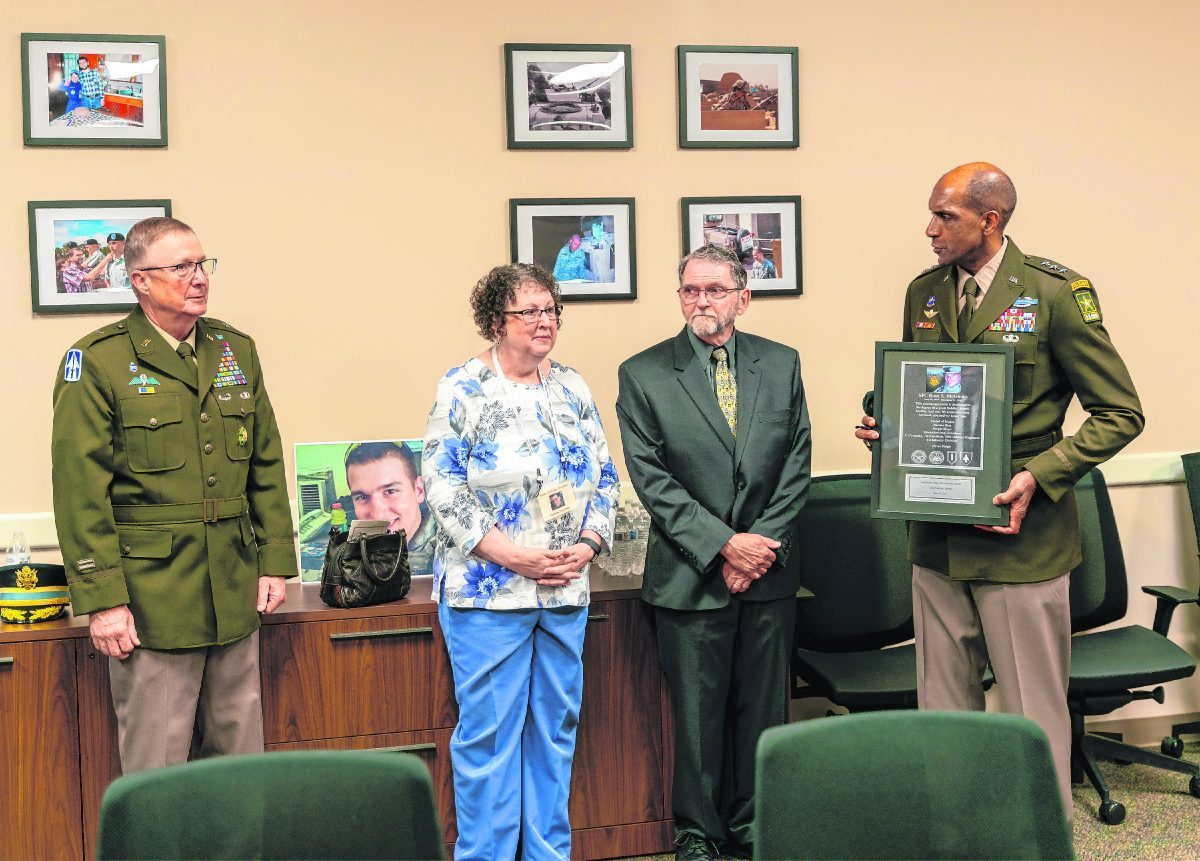At just 19 years old, a Soldier just promoted to Specialist in the U.S. Army decided in a split second to sacrifice his life to save the lives of four people riding with him in an army vehicle.
It was Dec. 4, 2006 when Specialist Ross McGinnis died, smothering an exploding grenade in a convoy in Baghdad. His actions that day earned him the Medal of Honor, the highest military honor, posthumously in 2008.
At Camp Atterbury Tuesday, the lives of five people — McGinnis and four expeditionary civilians with military experience — were remembered with dedications at various buildings on the military and civilian training grounds near Edinburgh.
More than 100 people attended the event from around the world, including the Egyptian family of a fallen civilian recognized with a dedication. U.S. Pentagon employees, Indiana National Guard Adjutant General R. Dale Lyles and Rep. Greg Pence, R-Indiana, were also in attendance.
Anthony Acera, a U.S. Navy veteran, was on his fifth deployment in Afghanistan working for the Defense Contract Management Agency when his convoy was attacked by enemy fire in Kabul, killing him in 2011 at 56 years old.
Krissie Davis, employed by the Defense Logistics Agency, went through a deployment in Kuwait and Kyrgystan before heading to Afghanistan to prepare excess military equipment for disposal. At 54 years old, she died when a rocket flew into her vehicle at the Bagram Air Base.
Maged Hussein, an Egyptian immigrant, worked for the U.S. Army Corps of Engineers, serving multiple tours of duty in Iraq, where, at 43 years old, he was killed.
Michael Suaro worked with the Defense Ammunition Center from 1999 until his death in 2016 in Kabul, a day after his 40th birthday. Suaro was part of team conducting training and advisory missions. Prior to his time as a civilian in the military, he aspired to be a sports broadcaster.
At Camp Atterbury’s Building 349, McGinnis’ parents and military personnel discussed his life and his service in the U.S. Army. They remembered him as a jovial individual who loved being able to serve, and loved who he served with, saving four of his fellow Soldiers in his final moments.
Lt. Col. Michael Baka promoted McGinnis to Specialist just before his death.
“Three of those four Soldiers were married, two had children. This young man never had that experience and will never have children. But in a split second, he chose to save those four people because he loved them,” Baka said. “When you care about others and serve and train one another and know everyone like they’re your own family, I guarantee for every one of those four Soldiers, if they had the choice, they would do the same thing.”
One of those Soldiers was retired Staff Sgt. Ian Newland, who remembers McGinnis as a prankster who was full of energy and curiosity.
“It would be a Sunday at dinner, and he’d be wanting to know how you take apart a 50-caliber machine gun. It’s like, ‘we’re not at work anymore, relax.’ He’d call Wednesday at 8 p.m. and say, ‘did you know the first rifle used by the infantry was this rifle?’ He was very inquisitive. He was hilarious. He was a prankster,” Newland said.
“He chose to sacrifice his life to save our lives. His dad told me at Arlington (Virginia) with the Medal of Honor, ‘What he gave me was the gift of something that cannot be repaid.’ I’ve lived with that as motivation for the rest of my life.”
While McGinnis’ parents raised him, the Army shaped him, said Tom McGinnis, his father.
“I always have to think about the Soldiers down there and what they were supposed to do. Some made it back and some didn’t, but they were all like him. If any of them were asked to do it, I’m pretty sure they would,” McGinnis said. “We raised him, but the Army molded him. They took this little kid and made him into a Soldier.”





